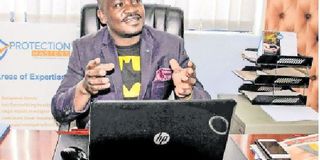How brand protection can help save company

Calvin Abbey Country manager with Protection Masters Ltd.
PHOTO | PAUL LETIWA | NATION MEDIA GROUP
What you need to know:
- Major firms have gone bust over the years with some promising products ending up obsolete in the blink of an eye.
- A report by the Kenyan Association of Manufacturers shows that contraband goods are mainly from India and China.
In the ever-changing world of technology, a company needs to do more than just keep up with the times in order to ride the storm.
Major firms have gone bust over the years with some promising products ending up obsolete in the blink of an eye.
In Kenya, many outfits make the mistake of overlooking branding efforts because they think of themselves as a business and not a brand. Branding is important for businesses of all sizes because it increases their value, gives employees direction and motivation, and makes acquiring new customers easier.
Companies big and small are now focusing on brand protection by dealing with illegal imports, counterfeit products, doing background checks, fraud investigations and due diligence so as to protect their image.
CLIENT BASE
Mr Calvin Abbey, a country manager with Protection Masters Ltd, an agency that helps corporates to protect their brand and image, says that when a company presents itself in a professional way —and when there is social proof that their products and services are quality — its client base will grow.
“No matter the size of the business, the most successful businesses are the ones that have established themselves as a leader in their industry by creating a strong brand. And, when these businesses focus on building valuable customer experiences, they easily transform customers into brand ambassadors,” he told Smart Company.
Protection Masters, which also specialises in business intelligence and illicit trade points out that the majority of Kenyan businesses are now seeking services from experts to curb counterfeiting and protect their customers.
“Our market study shows that counterfeit and illegal imports are what is affecting most companies in East Africa. When dealing with counterfeiters, the first step is to gather intelligence and identify the infringer. That is what we do at Protection Masters,” he says.
COUNTERFEIT MANUFACTURERS
In Kenya, the investigative agency says, counterfeit manufacturers close down and open up again if they find out that they are being investigated. It therefore becomes an issue of securing evidence the first time you have the chance, and making sure they;re not aware of you being there until you have the case ready, Mr Abbey says.
Anti-counterfeiting is a task that takes up resources. A well-prepared plan heightens chances of a positive outcome for any given case. Often when no action is taken, the counterfeiting problem and the counterfeiting company grow.
In 2016, for example, Kenya was ranked among the largest markets for counterfeit goods in East Africa and also serves as a distribution point to the region.
A report by the Kenyan Association of Manufacturers shows that contraband goods are mainly from India and China.
Acting on a counterfeiting manufacturer and/or distributor is a complex matter, say experts, which can be handled in three ways: in-depth knowledge of a company’s product and the counterfeiting product, knowledge of the law on counterfeit and an analysis of what effect the counterfeit product has on your business, both in the short- and in the long-term.


